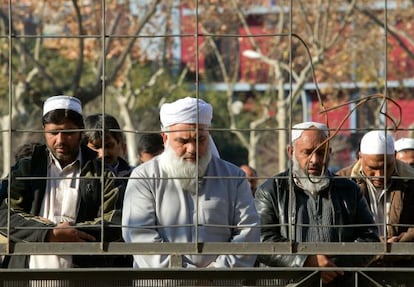US cites Spain’s discriminatory policies against Muslims who try to build mosques
Government’s annual religious survey details Barcelona soccer stadium incident involving Israeli soldier Shalit

Restrictions by municipal governments prohibiting non-Catholic faiths from assembling to practice their beliefs and examples of anti-Semitism are highlighted in the latest US government report on religious freedom in Spain.
Prepared by the US State Department, the report is an annual survey of how religious tolerance and freedoms fare in different nations across the world.
“The [Spanish] Constitution and other laws and policies protect religious freedom. However, some local government policies restrict the religious freedom of minority religious groups, including Muslims and non-Catholic Christians,” states the document released in Washington on Monday.
It cites instances in some cities where Muslim groups charge that special ordinances have been “politically motivated,” such as in Lleida where the city council prohibited the use in public buildings of the burqa, niqab and other Islamic clothing that covers the face. In February, however, the Supreme Court overturned that law which was challenged by the Watani for Freedom Muslim immigrant group.
Badalona banned Muslims from using public spaces for prayer on Fridays
But the biggest problem facing Muslim groups last year was obtaining permits from local town and city officials to build mosques. The Jewish community and some evangelical groups also reported difficulties in securing permits for new places of worship. “Although Catalonia had the highest concentration of Muslims in the country, it lacked a formal mosque; Muslims worshiped in approximately 200 prayer centers. Among the factors that Muslim leaders cited for the absence of a formal mosque was opposition from neighborhood groups and from some political parties,” states the report.
Last July, Molins de Rei, a town outside Barcelona, said that it was suspending indefinitely all constructions of religious buildings, a move Muslim groups believe was aimed at them. In Torrejón de Ardoz, near Madrid, a signature drive was initiated to keep the city from granting a permit for a mosque in the center of town. In Badalona, Catalonia, Mayor Xavier García Albiol of the Popular Party (PP) announced that Muslims would no longer be permitted to use public spaces for prayer on Fridays and during Ramadan.
The report also states that Jewish groups continued to be the target of anti-Semitism in the media and on the streets. In one high-profile incident, vandals spray-painted graffiti reading “No Jew in the house… terrorist state” on the walls of the Camp Nou stadium when former Israeli soldier Gilad Shalit, who had been kidnapped by Hamas in 2006 and held for more than five years, attended a Barcelona game in September.
In Sabadell, a court indicted members of two neo-Nazi rock bands and their managers for hate-related crimes related to songs, and in November police closed down a neo-Nazi website for “spreading xenophobic messages and promoting ideas that supported genocide.”
The report also detailed steps taken by the Spanish government to help religious groups integrate into society. Among the measures taken have been funding teachers for Catholic, Islamic, Protestant and Judaic instruction in public schools when at least 10 students request it. Military rules now allow military funerals by various religious groups. And the government also allows workers to take Jewish and Islamic holidays, including Friday afternoons from work, to observe the Sabbath.
US government officials held meetings and roundtables on religious freedom and tolerance with Spanish government officials last year.
Tu suscripción se está usando en otro dispositivo
¿Quieres añadir otro usuario a tu suscripción?
Si continúas leyendo en este dispositivo, no se podrá leer en el otro.
FlechaTu suscripción se está usando en otro dispositivo y solo puedes acceder a EL PAÍS desde un dispositivo a la vez.
Si quieres compartir tu cuenta, cambia tu suscripción a la modalidad Premium, así podrás añadir otro usuario. Cada uno accederá con su propia cuenta de email, lo que os permitirá personalizar vuestra experiencia en EL PAÍS.
¿Tienes una suscripción de empresa? Accede aquí para contratar más cuentas.
En el caso de no saber quién está usando tu cuenta, te recomendamos cambiar tu contraseña aquí.
Si decides continuar compartiendo tu cuenta, este mensaje se mostrará en tu dispositivo y en el de la otra persona que está usando tu cuenta de forma indefinida, afectando a tu experiencia de lectura. Puedes consultar aquí los términos y condiciones de la suscripción digital.








































